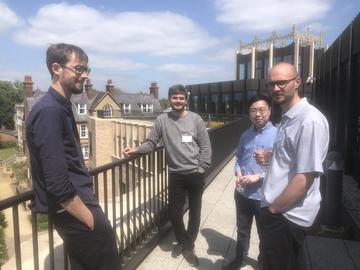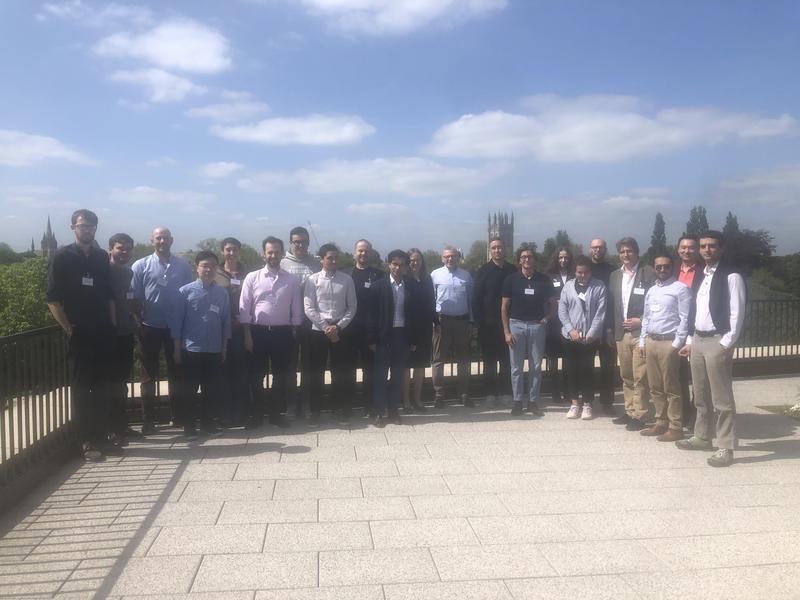The GloCoBank project was delighted to host a group of twelve early career researchers at St Hilda’s College on 25-26 May 2023 for our second annual project workshop, ‘New Frontiers for Data Analytics in Economic, Business and Financial History’. The workshop was organised by GloCoBank Data Analysis Research Associate, Dr Alena Pivavarava, with the aim of connecting early-career researchers endeavouring to advance the frontiers of future research within their core disciplines and to set a new vision for data analytics in historical research.. The workshop was also attended by a further 27 members of the project’s research network and wider academic community and provided a forum for knowledge dissemination and critical discussion of the presented research.
Following an opening address by project PI, Professor Catherine Schenk, the first session focused on new approaches to digitisation, automated georeferencing, and big data workflows in historical research. Our first speaker Josef Lilljegren (University of Groningen) demonstrated novel applications of Zir, a GUI software for OCR of printed source material, within a wider research project on Dutch listed companies. The paper presented by Giovanni Maria Pala (Oxford) advanced our knowledge on how digital methods can be used to read and assess the precision of historical maps. The challenges presented by digitisation of historical sources triggered much discussion and knowledge exchange during breaks.
The second session continued with a paper from Giulia Occhini (University of Bristol, The Alan Turing Institute) and co-authors Emmanouil Tranos (The Alan Turing Institute) and Rui Zhou (University of Bristol), on sourcing data from the Common Crawl to innovate industry classifications and improve the analysis of economic activities over space and time. Michael Hödl (University of Vienna) contributed to the discussion with his paper on mapping the evolution of Vienna’s economic spatial structures using microdata on city locations of enterprises from 1880 to 1934.
The second session delved into advanced applications of text-mining and machine learning for economic and banking time-series. The first half of this session featured papers from Mayukh Mukhopadhyay (London Business School) et al, on constructing a 170-year time series to measure news-based economic sentiment, followed by Petr Sterba (Prague University of Economics and Business) who presented an NLP-based analysis of the media image of correspondent banking in the US. Finally we heard from Ricardo Salas Diaz (Massachusetts) on the Banco de la Republica in Colombia, analysing biographies of central bankers across 100 years, and Jacob Weber (UC Berkeley) who presented new data sources on technology transfers (TTAs) with the Soviet Union during the Great Depression to examine the potential impact of financial distress on cross-border technology sales and collaboration.

From left, Poukens, Hoedl, Wong, Rogissart
Day Two continued with a session on merging databases for financial modelling. The paper by Brecht Rogissart (EUI) discussed the geographic scales of Belgian financialisation between 1870 and 1914, followed by Johan Poukens (Antwerp & State Archives of Belgium), who presented an initiative to construct a historical household finance database from heterogeneous sources for Belgium and the Netherlands for which an extensible common data model based on GSIM has been developed. The project aims to become a prototype for international datahubs for historical finance research.
Our final session explored the Social Network Analysis (SNA) methods that can be applied to visualise and analyse the evolution of social networks derived from large-scale digitised sources. This included papers from Sebastian Lowe (Oxford), who discussed applications of social network analysis in studying the origins of neoliberal Euroscepticism, and Brian Tsz Ho Wong (Edinburgh) on capital and power elites networks in the Japanese empire's non-ferrous metals industry.
This was followed by a workshop dinner for invited speakers and members of the GloCoBank team in order to continue the discussion of project and workshop themes, future directions and opportunities for collaboration.
The workshop provided an important opportunity to examine the GloCoBank project’s own data collection and approaches to data analysis and to learn from the successes and challenges of others working with new historical data sources, extracting and digitising data, creating large-scale datasets and databases, and using a range of analytical techniques and tools in their research. The connections made at the workshop will prove invaluable in continuing the dialogue and establishing an ongoing research community in this area.

Workshop group May 2023